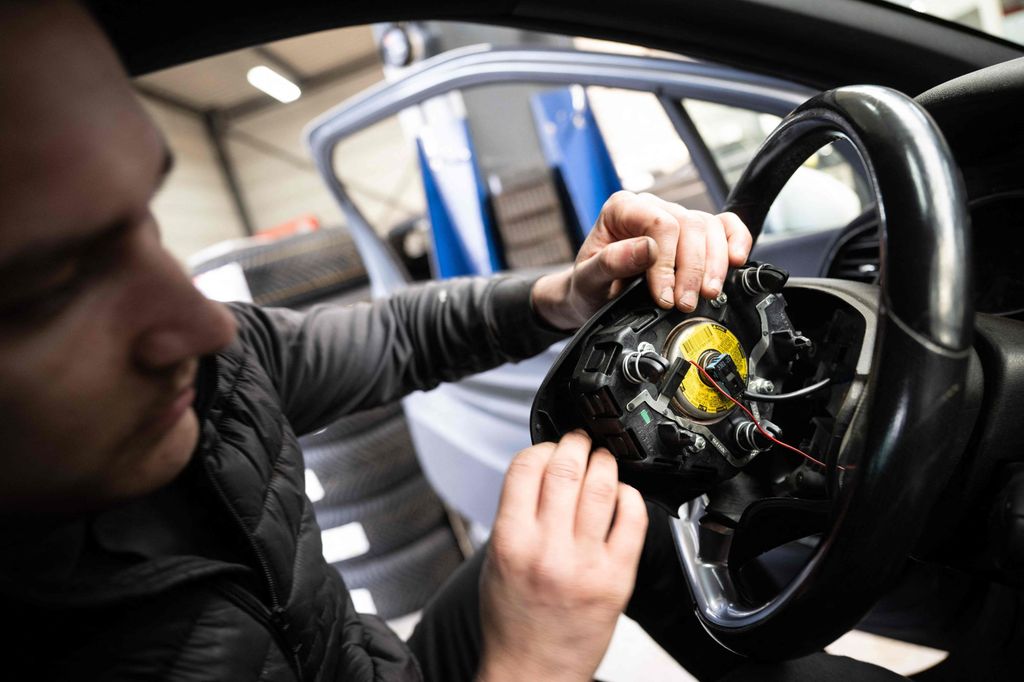
The UK automotive sector is currently navigating a significant challenge, with a rare ‘stop-drive’ order issued for certain Citroen and DS Automobiles models due to a potentially fatal airbag safety fault. This unprecedented directive, given on June 20, has plunged thousands of motorists into uncertainty and considerable disruption, prompting swift and vocal intervention from the highest levels of government. The Transport Secretary has conveyed ‘serious concerns’ directly to the car manufacturer Stellantis, underscoring the gravity of the situation and the widespread impact on drivers across the United Kingdom.
This unfolding crisis has highlighted critical gaps in customer support and transparency within the recall process. While car manufacturers routinely issue recalls for various issues, the severity and scale of this ‘stop-drive’ order, coupled with reports of inadequate support for affected consumers, have drawn sharp criticism from both official bodies and consumer advocacy groups. The situation has forced a collective re-evaluation of how such large-scale safety issues are managed and communicated to the public, particularly when they render vehicles unusable.
This article delves into the specifics of this major recall, examining the official warnings, the technical details of the fault, Stellantis’s operational response, and a separate, yet related, recall impacting Peugeot vehicles. It aims to provide a comprehensive overview of the situation as it stands, drawing directly from the information provided by official statements and consumer reports.

1. **The Imposition of a Rare ‘Stop-Drive’ Order** On June 20, a significant and highly unusual safety directive was issued: an immediate and rare ‘stop-drive’ order for specific models of Citroen and DS Automobiles-branded cars. This order was necessitated by the discovery of a potentially fatal airbag safety fault, which posed an immediate risk to drivers and passengers. The proactive measure aimed to prevent any further incidents, emphasizing the critical nature of the defect and the potential for severe consequences if affected vehicles continued to be operated.
The implementation of such an order immediately removes a vehicle from use, demanding that owners cease driving their cars until the identified safety issue has been rectified. For the thousands of affected motorists in the UK, this has translated into weeks, and in some cases potentially longer, of being without their primary mode of transport. The sudden imposition of this order has led to widespread logistical challenges and significant personal inconvenience for many car owners, underscoring the severity of the safety concern at hand.

2. **Transport Secretary Expresses ‘Serious Concerns’** Transport Secretary Heidi Alexander has directly addressed the leadership of Stellantis, the parent company of Citroen and DS Automobiles, to convey her profound ‘serious concerns’ regarding the recall’s impact on UK drivers. In a letter dispatched to Eurig Druce, the UK group managing director of Stellantis, and seen by the PA news agency, Ms. Alexander called for ‘immediate steps’ to rectify deficiencies in the recall process. Her intervention highlights the government’s close monitoring of the situation and its commitment to safeguarding consumer interests amidst the disruption.
Ms. Alexander explicitly stated, “I am writing to you to express serious concerns about the customer impact of the stop-drive recall currently affecting Citroen and DS Automobiles cars in the United Kingdom.” She further emphasized that while acknowledging the pace of the recall program’s initiation, “the level of disruption experienced by UK motorists – particularly the most vulnerable – is unacceptable.” The Cabinet minister also noted having “received numerous reports from Members of Parliament and their constituents detailing distressing experiences, lack of clear guidance, and inadequate support for alternative transport arrangements,” asserting that the recall had “exposed significant gaps in customer support and transparency.”

3. **Understanding the Potentially Fatal Airbag Fault** The core of the ‘stop-drive’ order lies in a critical safety defect within certain Takata airbags installed in the affected vehicles. The issue stems from the chemical propellant used in these inflators, which has been found to deteriorate over time. This degradation can lead to a catastrophic failure during deployment, causing the airbag to rupture and potentially propel metal fragments into the vehicle’s cabin. Such an event carries a direct risk of severe injury or even fatality to vehicle occupants, necessitating the urgent recall.
Although Stellantis has confirmed that “No incidents have been reported in the UK” directly related to this specific airbag fault, the company initiated the ‘stop-drive’ order across Europe as a precautionary measure. This decision was made following a tragic incident in France, where a woman was killed when her airbag exploded due to the very same defect. This fatality underscored the severe and undeniable risk associated with the faulty components, compelling Stellantis to take immediate and drastic action to protect public safety across the continent, including the UK.

4. **The Extensive Scale of the UK Impact** The ‘stop-drive’ order has profoundly impacted a substantial segment of the UK motoring public, with Stellantis confirming that “120,000 vehicles in the UK” are affected by the Takata airbag recall. This considerable number of cars being rendered undriveable creates a ripple effect, disrupting daily routines, professional commitments, and essential services for tens of thousands of households. The sheer volume of affected vehicles presents an enormous logistical challenge for both the manufacturer and the network of dealerships tasked with carrying out the necessary repairs.
Consumer group Which? has accurately characterized the issue as a “major upheaval” for owners, particularly those who are heavily reliant on their vehicles for daily activities and find themselves without viable alternative transport options. The immediate prohibition on driving these cars, coupled with the extended waiting periods for rectification, has resulted in significant inconvenience, financial strain, and considerable stress for many British motorists, highlighting the widespread nature of the crisis.
Read more about: Unpacking the Hype: Why Hyundai’s Latest EVs Are Earning Unanimous Praise

5. **Stellantis’s Operational Response and Progress** In response to the recall, Stellantis has publicly stated that its Citroen network is “fully engaged” in addressing the issue, with a focus on “maximising the daily number of cars that can have their airbags replaced.” Recognizing the immense scale of the repair effort, the company has taken steps to accelerate the process, including authorizing its Peugeot network to “also carry out the work.” This expansion aims to increase overall capacity and expedite the resolution for affected customers.
Stellantis acknowledged the inherent challenges of such a large-scale operation, stating, “It is inevitable, with such a large number of vehicles affected, that customers could be inconvenienced in the short term.” Despite ongoing difficulties reported by consumers, the company reports significant progress, indicating that “more than 72,000 vehicles have had their new replacement airbags fitted” to date.
The company has also provided a forecast, projecting that “the majority of customer vehicles will have their new replacement airbags fitted by the end of September, with the remaining cases handled as swiftly as possible within the coming weeks.” For owners seeking information, Citroen has advised checking vehicle status via the VIN tool on its UK website.

6. **Stellantis’s Stated Mobility Support Options** Stellantis has outlined a range of options designed to support the mobility needs of affected drivers during the recall period, recognizing that “every driver has specific requirements.” The company asserts that “For each and every customer, we discuss options to support mobility.” These discussions aim to tailor solutions that best fit the individual circumstances of the owners whose vehicles are subject to the ‘stop-drive’ order.
The enumerated support options include “replacement airbags at a dealership or at home,” providing flexibility for the repair process. Additionally, the company offers “a courtesy car,” “support for other mobility options,” and “recovery services” for undriveable vehicles.
Stellantis has also affirmed its commitment to prioritizing assistance, stating, “We give priority to those with the most urgent needs,” aiming to alleviate the burden on the most vulnerable motorists impacted by the recall.

7. **A Separate Strain: The Peugeot 308 Seatbelt Recall** Adding to the ongoing pressures on Stellantis’s dealer network, a separate recall has been initiated for certain Peugeot 308 models, further complicating the operational landscape for the car manufacturer. This latest notice, sent to customers last week, addresses concerns surrounding a “seat belt anchorage on the 2nd seat row.” While this recall is distinct from the more severe ‘stop-drive’ airbag issue, it nonetheless represents another significant demand on the company’s resources and dealer capacity.
A letter to motorists, signed by Christopher Woosley, Stellantis’s director technical quality & warranty, indicated that the component is at ‘potential risk of rupture during a crash event’. The necessary remedy involves reinforcing the seat belt anchorage on the second-row seats, described by Stellantis as “essential” precautionary work. Crucially, this recall is “stopping short of issuing another ‘stop-drive’ notice,” meaning owners are not prohibited from driving their vehicles.
This issue specifically applies to “308 models built between October 12, 2015 and December 1, 2019,” with online reports suggesting nearly 250,000 cars globally could be impacted, though this figure remains unverified for UK drivers. The dual recalls place significant additional strain on Peugeot’s already “beleaguered dealer network.”
While the initial section outlined the technical specifics of the ‘stop-drive’ recall, the government’s rapid response, and Stellantis’s efforts to manage the crisis, the real impact of this unprecedented situation is perhaps best understood through the experiences of those directly affected: the motorists themselves. This section shifts focus to the considerable human and financial toll borne by UK consumers, detailing their struggles, the gaps in support, and the urgent calls for greater accountability from both the manufacturer and regulatory bodies. The narratives emerging from affected drivers highlight a significant disruption to daily life, underscoring the necessity for robust consumer protection measures in such large-scale safety incidents.

8. **The Consumer Burden** The ‘stop-drive’ order has inflicted significant disruption on tens of thousands of households across the United Kingdom. Consumer group Which? has characterized the issue as a “major upheaval” for owners, particularly those who are heavily reliant on their vehicles for daily activities and find themselves without viable alternative transport options. The immediate prohibition on driving these cars, coupled with extended waiting periods for repairs, has created considerable stress.
Transport Secretary Heidi Alexander also noted that she had “received numerous reports from Members of Parliament and their constituents detailing distressing experiences, lack of clear guidance, and inadequate support for alternative transport arrangements.” She further asserted that the recall had “exposed significant gaps in customer support and transparency,” stating that while Stellantis conveyed intentions to minimize the burden on consumers, this “has not been the experience for many of those affected.”
Read more about: Built to Last: A Deep Dive into the Most Reliable and Least Dependable Affordable SUVs for Long-Term Value

9. **Voices from the Ground: Personal Narratives** Specific accounts from affected motorists underscore the severe personal consequences of the recall. Petra*, a disabled individual on benefits, recounted being “forced to rent a car to get her husband, who has terminal cancer, to hospital for life-extending treatments.” She stated, “I’m now nearly £900 out of pocket already,” with this expense consuming her entire month’s income and leaving her reliant on family for food.
Eva and Eta from Cardiff faced significant travel disruptions, including a non-refundable booking on Le Shuttle and a hospital appointment in London. Their scheduled dealer appointment was canceled due to parts unavailability, leading them to purchase a new car for £10,000. Eta expressed their frustration, stating, “Suffice it to say, we won’t be buying another Stellantis car again; this has been a gigantic headache and they’ve been resoundingly unhelpful throughout.”
Another account from Lisa* detailed her attempts to assist her daughter, who cycles 15 miles daily to work with special educational needs children and incurred a chest infection. Lisa’s efforts included insuring her own vehicle for her daughter, at a cost of £182 with a £1,000 excess. She lamented, “We now have two undrivable cars on the driveway. We work hard and feel very let down. My husband passed away nine years ago, and life has been a struggle, and this is making life so much harder.” Anne*, a disabled resident in a rural area, was “left with no choice but to hire a car costing £399,” stressing, “I’m not sure how I’ll manage after that.” Vicki* on Facebook shared concerns about needing a car for hospital visits for their preterm baby, being told repairs could take until October.

10. **The Compensation Conundrum** A significant area of contention for affected owners revolves around compensation for alternative transport. Some owners reported being offered a maximum of £22.50 per day, a sum which the consumer watchdog Which? highlighted as “far below the cost of car hire in most regions.” The difficulty in accessing even this limited compensation was evident in Petra’s experience, as she “has been unable to contact her local dealer and that ‘the phone keeps ringing out’.”
Michael Passingham, a senior researcher at Which?, pointed out a lack of public transparency regarding Stellantis’s compensation scheme. He stated, “It’s only through these owner emails that I uncovered the existence of Stellantis’ compensation scheme that, from what I understand, is only available to those Stellantis deems to be vulnerable, or to those who have a disability.” He added, “What frustrates me the most is that Stellantis won’t publicly acknowledge it,” leading to inconsistencies in how customers are informed and supported.
Read more about: America’s Housing Conundrum: A Deep Dive into the Systemic Roots of Unaffordability and the Fading Dream of Homeownership

11. **Challenges in Customer Support** The recall has exposed considerable challenges within Stellantis’s customer support framework, contributing to the widespread frustration among affected motorists. Numerous reports detail a “lack of clear guidance” and “inadequate support for alternative transport arrangements,” as highlighted by Transport Secretary Heidi Alexander. This operational deficiency meant that existing arrangements were “not meeting expectations” for many.
Owners have reported significant difficulties in engaging with Stellantis’s helplines and obtaining necessary information. Lisa* recounted trying to call the Stellantis hotline “more than 200 times” on behalf of her daughter. Beyond communication issues, the logistics of repair presented further hurdles, with some owners being told to “take it up with Stellantis” when seeking reimbursement for towing or other costs.
Which? also raised concerns about the practicalities of getting undriveable cars to garages for repair, particularly if garages are unwilling to provide towing services. They emphasized the critical need for “clear and practical solutions” from the network of garages, including confirmed courtesy cars, at-home repair options, or vehicle collection services, to prevent owners from driving potentially dangerous vehicles in contravention of insurance policies and law.
Read more about: Hidden Gems of the Highway: Revisiting 12 Forgotten Compact Cars of the 1960s

12. **The Legal Landscape and Insurance Implications** The ‘stop-drive’ order has introduced significant legal and insurance complexities for vehicle owners. A key concern is that “Driving a car with a stop-drive recall can invalidate your insurance,” potentially leaving motorists uninsured in the event of an incident. Furthermore, the legal ramifications extend to sales, as “it’s illegal for a private seller to sell a car with a recall without disclosing it first,” creating complications for owners wishing to dispose of affected vehicles.
Despite the risks, some owners reported feeling they had “no choice but to keep on driving despite the risks” due to the lack of viable alternatives. The widespread disruption and financial burden have also led to discussions within the legal community. Lawyers have indicated that customers affected by the recall “could be entitled to hefty compensation amid talk of potential group action,” suggesting the possibility of consolidated legal challenges against Stellantis.
Read more about: The Software Guru Behind a Viral Retirement Calculator Reveals Her ‘Boring’ Secrets to Financial Independence
13. **Which?’s Advocacy and Demands for Stellantis** Consumer champion Which? has emerged as a vocal advocate for affected motorists, directly challenging Stellantis to improve its handling of the recall. The group has formally written to the UK government, asserting that Stellantis has “demonstrated a deliberate lack of public clarity on compensation,” and that inadequate communication between head office and dealerships is leading to delays and financial hardship for owners.
Which? has outlined three specific actions it demands Stellantis to undertake. First, the consumer group urges Stellantis to “Confirm a formal compensation scheme,” which would entail a clear and firm commitment to cover all reasonable costs incurred by affected drivers. This includes expenses for alternative transport, lost earnings, or other direct financial impacts resulting from the recall.
Second, Which? calls for Stellantis to “Address helpline issues,” demanding urgent improvements to customer support by providing clearer advice on how cars can be brought to garages, routes to compensation, and access to courtesy cars, particularly for vulnerable consumers or those reliant on their vehicles for work. Finally, Which? insists that Stellantis “Provide clear garage solutions,” instructing its network to offer practical solutions like courtesy cars, at-home repair options, or vehicle collection services to ensure safe repairs.
14. **Which?’s Appeal to Government for Intervention** Beyond its direct demands to Stellantis, Which? has escalated its concerns to the UK government, urging official intervention and accountability. The consumer group has written to both the Driver and Vehicle Standards Agency (DVSA) and the Department for Transport (DfT), formally outlining their concerns and appealing for these bodies to step in and assist consumers. This highlights the severity of the situation and the perceived inadequacy of the current recall management.
Sue Davies, Which? head of consumer protection policy, underscored this call, stating, “The government needs to step in and hold it to account to ensure UK consumers have much greater clarity of what they need to do and what they are entitled to – and are never left in this position again.” Despite this appeal for governmental oversight, the DVSA has indicated that the operation of a compensation scheme is a “commercial decision for Stellantis” and that it operates “at arm’s length and monitors recalls.”

15. **Expert Analysis: An ‘Omnishambles’ and Future Precedent** The extensive fallout from the Citroen recall has drawn sharp criticism and expert analysis, particularly regarding the handling of customer impact. Michael Passingham, a senior researcher at Which?, described the situation as an “omnishambles,” expressing deep sympathy for those caught up in the widespread disruption. He highlighted the significant financial burden on drivers, stating that “almost all drivers will ultimately find themselves out of pocket in some way – even if the repair itself is free.”
Passingham acknowledged Stellantis’s commercial considerations in potentially avoiding a compensation bill running into “tens of millions of pounds in the UK alone.” However, he argued that this does not excuse the unilateral decision to render these cars effectively illegal to drive, which places an undue burden on consumers who rely on their vehicles for essential daily activities.
The sheer scale and nature of this ‘stop-drive’ recall are unprecedented in the UK, as noted by Passingham. He concluded that while unique, the situation now sets a critical benchmark. “But now there is precedent,” he stated, emphasizing that both “car companies and the authorities need to be prepared for the next time,” underscoring the necessity for more robust and consumer-centric recall protocols in the future.
The unfolding Citroen recall, an ‘omnishambles’ as described by one expert, serves as a stark reminder of the complexities and human impact of large-scale safety directives. This unprecedented event has exposed significant gaps in customer support and transparency, prompting urgent calls for greater accountability from manufacturers and more proactive intervention from regulatory bodies. As the industry moves forward, the lessons learned from this challenging period will undoubtedly shape the future of vehicle safety recalls, with an amplified focus on consumer protection and clear, effective communication strategies. This situation sets a vital precedent, compelling all stakeholders to enhance preparedness for future safety challenges and ensure that the burden of such crises does not fall disproportionately on vulnerable motorists.





